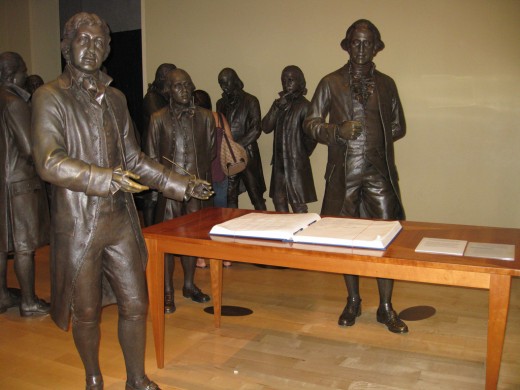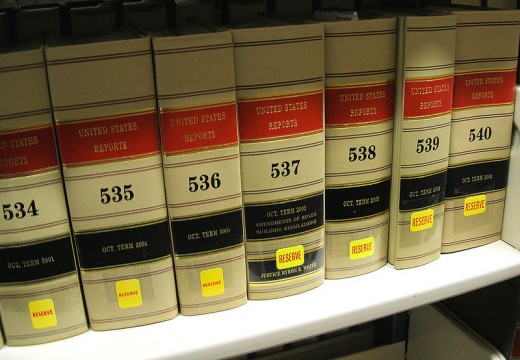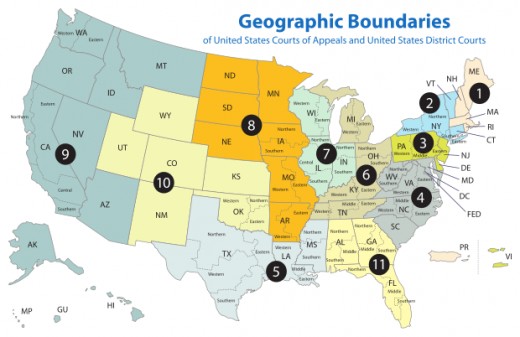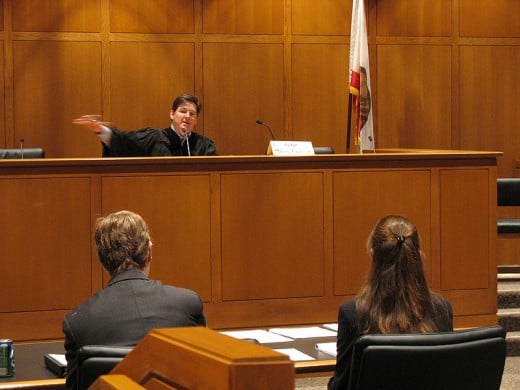How to Conduct Legal Research to support a Pro Se legal Argument
Gavel

Pro Se Appearance
Have you ever appeared Pro Se in court?
Pro se Litigants are Held to the Same Standards as Lawyers
Many people who are faced with certain types of legal issues may not be able to afford an attorney. Some of these individuals may try to represent themselves. However, be aware that a pro se litigant is held to the same standards as an attorney. If you are among the minority of individuals who decide to represent yourself in a lawsuit or other legal matter, then you should learn how to conduct legal research in order to prepare an effective argument.
Legal Authority to Support a Case
Legal authority is the body of law that supports your case. A law that is relevant to your case may be found in a constitution, statute, regulation, municipal ordinance, a prior case that sets precedence and other secondary sources that this article does not cover .
Drafters of the Constitution

Constitution
The constitution guarantees many freedoms such as; speech, press, religion, assembly, the right to bear arms and freedom to petition. The constitution protects against cruel and unusual punishment; unreasonable searches and seizures; prohibits self incrimination and prohibit laws that promote religion. The constitution also prevents the federal government from depriving us of life and liberty without due process of law. State Constitutions are basically similar to the United States Constitution. However, state constitutions may guarantee more rights to its citizens than the United States Constitution.
This is an example of a section of the New Jersey Constitution:
- The right of the people to be secure in their persons, houses,papers and effects against unreasonable searches shall not be violated; and no warrant shall issue except upon probable cause, supported by oath or affirmation, and particularly describing the place to be searched and the paper and things to be seized. (N.J. Const. art. 1,§7)
The above provision has been interpreted by the New Jersey Court as "guaranteeing greater rights to citizens against unreasonable searches and seizures than the Fourth Amendment." [1] As such, police officers who search people’s garbage left in a bin in front of their homes for evidence, may violate the New Jersey constitution but not the United States Constitution.[2]
Statutes
A statute is a written law that is enacted by the legislative branch of government. Statutes are the main or primary authority in our legal system. A statute prohibits, declares or commands something.
An example of a statute that is applicable to New Jersey is as follows:
N.J.S.A. 2C: 39-5 Unlawful Possession of Weapon
- (a) Machine Guns. Any person who knowingly has is his possession a machine gun or an instrument or device adaptable for use as a machine gun, without being licensed to do so as provided in N.J.S.A. 2C:5-5, is guilty of a crime of the second degree.
The statute above advises the public what constitutes unlawful possession of a machine gun. The companion statute below declares the penalty for unlawful possession of a machine gun.
N.J.S.A. 2C: 43-6 (a) Except as otherwise provided, a person who has been convicted of a crime, may be sentenced to imprisonment as follows:
- (2) In the case of a crime of a second degree, for a specific term of years which shall be fixed by the court and shall be between 5 years and 10 years.
Search and Seizure

Regulation
A regulation is a directive that is adopted by the executive body of government. Administrative agencies (part of the executive branch) are charged with making, adopting or amending regulations. Federal regulations first appear in the federal register. Federal regulations that are finalized are found in the Code of Federal Regulation. Regulations have the same effect of law.
The following is an example of a regulation:
- 42 CFR § 1003.102 Basis for civil monetary penalties or assessments.
- (a) The OIG may assert a penalty or assessment against any person whom it determines in accordance with this part has knowingly presented, a claim which is for-
- (4) A physicians service or item of service for which the person knew, or should have known, that the individual who furnished (or supervised the furnishing of) the service-
- (i) was not licensed as a physician;. . . .
The regulation above clearly advises the public that the Office of Inspector General (OIG) will penalize anyone who bills for physicians service that were performed by someone who is not a licensed physician. This regulation is enforced by the Department of Health and Human Services OIG.
False Arrest?

Ordinance
An ordinance is a law that is enacted by a municipal government. An ordinance governs a local town, city or borough. Many ordinances seek to regulate behavior for the public good i.e. health, safety and general welfare. An example of an ordinance is:
N.J. Code § 235.1 Loud or Unnecessary Noises Prohibited.
- It shall be unlawful for any person to make, continue or cause to be made or continued any loud, unnecessary or unusual noise or any noise which endangers the health safety, or welfare of the community or which annoys, disturbs, injures or endangers, the comfort, repose, peace or safety of others nearby or near to or upon a public highway, road, street, lane alley, park, residence, square or common whereby the public peace is broken or disturbed or exceeds the sound pressure levels enumerated in §235-4.
The above municipal code is very detailed as to what is prohibited. The penalty for violating this ordinance is enumerated in another section of the code .
Case law (Precedents)
Case law functions as legal precedents. Legal precedents are rules or principles that have been established in prior case. Legal precedents are binding or persuasive on subsequent cases.
For example, the precedent established by Miranda v. Arizona, 384 U.S 436 (1966) is as follows:
- Prior to any questioning, a person must be warned that he has the right to remain silent that any statement that he does make may be used as evidence against him and that he has a right to the presence of an attorney, either retained or appointed. 384 U.S 436 (1966)
This precedent is binding on all subsequent cases that involve a similar issue.
Law Library

How to find Laws that are relevant to your Case
Now that you know the types of laws, the next step is learning how to find them. You will find constitutions, statutes, regulations, municipal codes and cases at: law libraries; state and federal court web sites; legal research websites such as LexisNexis and WestLaw; university web sites; municipal web sites; the internet and web search engines such as Google Scholar.
Law school Law Libraries
The law libraries at many law schools are accessible to visitors. The law librarians are trained to help students and visitors find legal materials. As such don’t be afraid to ask for help with finding a case or statute.
United States Reporters

Reporters
Law libraries carry many series of books called “case law reporters” (Reporters). Cases and Judicial opinions from cases are published in these reporters.
Most states have their own reporters that are abbreviated by the state name. For example,
- Pennsylvania: Pennsylvania State Reports (P.A. Reporter).
- Illinois: Illinois Appellate Court Reports (Ill, Ill 2d)
However, you will find that most state decisions are published in the Reporters outlined below:
Reporters and the States that they Cover
Reporters
| Abbreviation
| States or Courts Covered
|
|---|---|---|
United States Reports
| U.S.
| Official Publisher of decisions of the United States Supreme Court
|
Supreme Court Reporter
| S.Ct.
| Decisions from: The Supreme Court
|
United Sates Supreme Court Reports, Lawyers Edition
| L.Ed, Ed.2d
| Decisions from:The Supreme Court
|
Federal Reporter
| F.2d, F.3d
| Decisions from: United States Court's of Appeal cases
|
Federal Supplement
| F.Supp, F.Supp 2d
| Decisions from:United States District Court
|
Pacific Reporters
| P. 2d, P.3d
| Decisions from:CA, AK, AZ, ID, HI. CO. KS, MT, NV, NM, OR, OK, UT, WA, WY
|
Atlantic Reporter
| A, A.2d
| Decisions from:NH, NJ, PA, RI, VT, MD,ME,DC, DE, CT
|
South Western Reporter
| S.W, S.W.2d, SW.3d
| Decisions from: TX, AR, KY, MO, TN
|
Southern
| So, So.2d, So.3d
| Decisions from: FL, AL, MS, LA
|
South Eastern Reporter
| S.E, S.E.2d
| Decisions from: VA, WV, GA, NC, SC
|
North Eastern Reporter
| N.E., N.E.2d
| Decisions from: NY, IL, OH, MA
|
North Western Reporter
| N.W., N.W.2d
| Decisions from:WI, SD, ND, NE, MN, MI, IA
|
Federal Rules Decision
| F.R.D
| Decisions from the Federal District Court
|
Federal Appendix
| F. Appx
| Decisions from the United States Courts of Appeals
|
How to use a Reporter to find Cases
In order to use a reporter you need to know:
- Name of the Reporter
- The Volume number of the reporter
- Page Number where the case is located
If you have never used a “reporter” to research a case you may find it easier to just look up the name of a case on the internet in order to get the name,volume and page number.
Example: To locate the case of Jarrell vs. Balkcom, 735 F.2d 1242 in a reporter you will break apart the sections of this case citation in the following manner:
735 (Volume number of Reporter)
F.2d (Name of Reporter i.e., Federal reporter)
1242 (page Number)
As such, to locate the case of Jarrell vs. Balkcom you need to look in volume 735 of the Federal Reporter 2d(second series) on page 1242.
Digests have Specific points of Law

Case Digests
A Case Digest (digest) identifies, summarizes and groups together summaries with specific points of law that are outlined in each reporter. Digests can be found near reporters in the library. Each reporter is linked to a digest. The summaries (called head notes) in digests are identified by their topic and key number.
For example, here are two head-notes that you may find in a digest:
Constitutional Law 259.1 (Constitutional law is the topic and 259.1 is the Key number)
- "Under the Fourth Amendment of the United States Constitution and Article 1, paragraph 7 of the New Jersey Constitution, “[a] warrantless search is presumed invalid unless it falls within one of the recognized exceptions to the warrant requirement.” State v Cooke, 163 N.J. 657 664 (2000)
- "-our Supreme Court held that Article 1, paragraph 7 of or state constitution may be independently “afford citizens of this state greater protection against unreasonable searches and seizures than may be required by the Supreme Court’s interpretation of the Fourth Amendment. . . ." State v. Alston, 88 N.J. 211, 225 (1981)
Both summaries (head-notes) identify aspects of the law related to unreasonable searches and seizures. The combined topic and key number represents that specific law. You may read these summaries quickly without need to read the two cases in entirety.
As you can tell, digests are reader friendly and helpful. In order to locate a case in a digest you need to get the key number.
You may obtain the key number by finding one case on the issue elsewhere, e.g., online, then use that information to find the case in the reporter. The key number for that case will be found on the first page of the case in the reporter. That key number can then be used to find all similar cases that match that key number. You may also find the key number by asking the librarian for help in searching the descriptive word index of the digest for words that express ideas about your case.
Municipal Building

City Websites
City ordinances can be found on your City’s Municipal wed site. You may find ordinances by entering the name of your city in Google then entering the word “ordinance” in the search box Some cities may list their ordinances under the heading City Codes or Code Book.
For example, the town of Cape Elizabeth in Main has its pending ordinances as well as its ordinances that are in effect listed on its web site. Cape Elizabeth’s ordinances are listed in alphabetical manner and identifies the; chapter number, name of each ordinance (e.g., fire protection code), date adopted, date effective as well as notes related to the ordinance.
The city of Long Branch New Jersey has its ordinances listed on its web site menu bar under the heading “City Code Book.” The codes are in a book form and arranged by progressive chapters that can be scrolled.
How to use Westlaw

LexisNexis Tutorial
Online Legal Research
The easiest and most reliable way to find legal authority is by using legal research websites such as LexisNexis and WestLaw. LexisNexis and WestLaw have large legal data bases and require a paid subscription.A yearly limited plan for LexisNexis may cost $200.00 per month. Less known sites such as Find-A-Case may cost approximately $8.00 per case.[3]. Fast-Case subscription fees are approximately 60% less that Westlaw and LexisNexis.
Searching LexisNexis
LexixNexis allows you to search in various ways. For example:
Search Tab
The Search tab is located on the home page and will be your best friend until you become an expert at searching.
The "Get a Document tab" gives you three search options:
Party Name: If you know names of both parties to a law suit you should enter both in the search area. For example, “Sarah Miller and Wal-Mart.”
Citation: If you know the citation just enter it in this box. For example,. 214 U.S. 130. If you know part of the case citation but know that is a 2002 case found on page 120 in the North Western Reporter, you will enter “2002 NWR 120” in the citation area. .
Docket Number: The docket number is the way courts classify cases. The best way to get a docket number is to contact the clerk of your court and give the part names and ask for the docket number. Once you have that number just enter it here.
Shepard's tab: This tab is located next to the “Get a Document tab.” This tab will let you know if a case has been overruled and as such cannot be used.
Legal Tab
This organizes the search pages and allows you to do various types of searches.
To search Multiple data bases:
1. Click all the data bases that are of interest to you
2.Click search to get many hits. You may define you search by:
- Terms and Connectors: A term may be a phrase, word,date or other item. Connectors are used to show some sort of relationship between terms. Using connectors such as “and” “or” “ W/S” “Not W/n” “W/P” with terms will help you get the desired result.
Examples:
- Marriage “and” counseling.
- Mary Brown “W/P” Board of Education
- Surgery AND NOT heart
- The use of the connector “and” in example (1) means to find documents that have the words marriage and counseling.
- The use of the connector “W/P” in example (2) means to find Mary Brown within the same paragraph as Board of Education
- The use of the connector :"AND NOT" in sentence (3) means to find a document with the word surgery but the word heart should not appear in the document.
You may also restrict your search by “date” in another box on the same search page. For example, “Date is 1999.”
- Natural Language: This feature may be the best option for you initially until you get comfortable with searching. Just enter a phrase in natural English without connectors. Try to enter mandatory terms or synonyms to narrow your hits.
For example: "What are the grounds for a divorce in the state of Texas?"
Sources tab: This allows you to identify the type of law and choose cases from a list of sources
Ex: Federal cases
- Click on legal then cases then federal
- The Federal cases option will give you the option of choosing from combined federal courts or a specific federal court. Federal courts are divided by circuits. For example, if you select the “3rd Circuit” you will have access to district courts in three states. The third circuit covers New Jersey, Delaware and Pennsylvania. The 2nd Circuit covers New York, Vermont and Connecticut.
Topic or Head-Notes tab: This is located on the right. The topic or head- note tab will give you a summary of a specific law. You may then click on the “more like this head-note” tab to get more cases with similar points of law. [4]
Remember:
- Clicking on the word Lexis will always take you back to the home page.
- Most of what you need will be under “Sources.”
- Click on the "i" next to each subcategory under sources to learn their contents.
- Use the Quick search tab to save time.
There are many other tabs and methods of searching that you will learn as you get more familiar with LexisNexis.
Computer Search

Free Online Sites for Statutes and Regulations
There are many free website that list statutes and regulations. Some of these web sites are:
- Laws.com :http://statutes.laws.com
- Onecle: http://Law.Oncle.com
- Supreme Court of the Unites States: http://www.supremecourt.gov/
- UCLA Law School: http://libguides.law.ucla.edu/content.php?pid=34909&sid=256638
- Rutgers law school Case Text: https://www.casetext.com/
- New jersey Legislature: http://www.njleg.state.nj.us
- Websites of Legislatures of other States for those who don’t live in New Jersey
- Electronic Code of Federal Regulations. U.S. Governmental Printing Office: http://www.ecfr.gov
- Code of Federal Regulations (Annual Edition). U.S. Government Printing Office: http://www.gpo.gov/fdsys/browse/collectionCfr.action?collectionCode=CFR
To find a case on the New Jersey Legislature website you should:
- Enter the New Jersey Legislature website by googling the name of the website or entering the web site address in your browser.
- Note that statutes on this web site are arranged by titles. For example, Title 1, 2, 3, 4.
- If you are not sure of which title you need, then do a quick Google search by entering your issue and a query. For example, “Child custody law by title in New Jersey”
- You will notice that Title Nine shows up with almost all the results. You may narrow you search by then googling “Title 9 (N.J.S.A 9) with cruelty and neglect of children.” The Google results will now identify the section of title 9 that covers this issue. For example, N.J.S.A 9:6-3 “
- Go back to New Jersey Legislature web site and click on “ N.J.S.A 9:6-3” to properly research your issue on child neglect and abuse.
The information on some free sites may be easier to access than your state legislature website. However,information on other free search sites may be less reliable than your state's website.
Regulations may also be accessed from administrative agencies web sites. For example, the web sites of your State Department of Transportation, Board of Nursing, Casino Control commission and Office of Weights and Measures will provide regulations that are pertinent to those agencies.
Google Scholar

Free search sites for Case law
There are many web sites that will allow you to conduct a free search for cases. Some of the following web sites have a “search feature” that allows you search for case law and other items.
- FindLaw.Com: http://caselaw.lp.findlaw.com/
- Cornell Law School: http://www.law.cornell.edu
- LawNix: http://www.lawnix.com/cases/
- OpenJurist:http://openjurist.org/us
- Leagle: http://www.leagle.com/
- Free CourtDockets:http://www.freecourtdockets.com/
- Justia:Justia.com
- Googlescholar: Googlescholar.com
Google Scholar
Google Scholar may be the easiest of the above websites to navigate. To access Google Scholar either google the words Google Scholar, or enter the address in your browser.
- Enter any search term in the search box on the first page. For example, lemon law. These words will bring up multiple cases on lemon law.
- Click on the type of court where the case was heard, or search by date range to narrow your search.
- Google Scholar also allows you to save all your searches in your “Library” which you can retrieve later.
Please note that some web sites may not always list or match the page numbers of their cases with the page numbers of cases found in reporters. As such, you may not be able to make a pinpoint citation when using some sites.
Citing Judicial Opinions
Pin-Point Citation
A pin point citation allows you to refer to a specific page where a passage or quote is found. Look on the left side of the full text of cases found on Google Scholar to find the page numbers that correspond to the page number in the print reporter.
For example, the number “501” that is highlighted on the left side of the page where “Beck v. Beck” is printed on Google Scholar, means that all words that appear next to and below that number are located on page “501” of the New Jersey Reporter.
You may pin point the following paragraph as follows;
- “ [a]s in all custody determinations the preference of the children of sufficient age and capacity must be accorded due weight."N.J.S.A 9:2-4. Beck v. Beck, 84 N.J 480, 501 (1981).
Beck v. Beck, 84 N.J 480, 501 (1981).
The case as cited above is considered a pin point citation because the paragraph is (as italicized) is found or pinpointed on page 501 of the reporter.
United States District Court

Which Legal Authorities Have Greater Weight?
When preparing your legal argument please remember that some authorities have greater weight than others. This means that you should use the more authoritative law to support your case. The authorities by order of importance are as follows
I. Constitution
(i) United State Federal Constitution
(ii) State Constitution ( A State may give broader protection to its citizens)
II. Statutes
(i) Federal Statutes
(ii) State Statutes (the state that your issue is being heard in)
(iii)Foreign (Another state)
III. Treaties
IV.Case Law
a. Federal Case Law decisions
(i) U.S. Supreme Court decisions
(ii) Appellate Court case decisions
(iii) Special Federal courts decisions such as: Bankruptcy and Patent Court
(iv) District Court decisions
(v) Administrative agency decisions
b. State Cases law decisions
c. Foreign case law decisions (A state outside the state that you live)
d. International case law decisions
V. Legislative Rulings/Decisions
VI. Administrative Rulings/Decisions
Use this list to prioritize use of decisions in your argument. For example, you would use a case that was decided in your state before using a case that was decided in another state.
Pro se Legal Argument

Citing to legal authority in your pro se written submission
You will strengthen your argument by citing to the legal authority (case law, statute, regulation) that supports your position.
An example of standard citation is as follows:
New Jersey DYFS v. PP, 180 N.J. 494, 852 A.2d 1093, 1100 (2004)
How to write each part of this citation? What does this citation mean?
Answer:
- The case is published in the New Jersey (N.J) Reporter as well as the regional Atlantic Reporter 2nd series (A.2d)
- New Jersey v. PP-(1) Write plaintiff's name followed by defendant or the name of the person appealing a case followed by the other party (2) Underline the names or italicize them (3) Insert a comma after the names.
- 180 -This the volume of the N.J. reporter.
- N.J.-This is the abbreviated name of the state reporter.
- 494-(1) This is the page number of the NJ reporter where the case starts (2) place a comma.
- 852- This is the volume of the regional reporter in which case is reported.
- A.2d -Write the abbreviated name of the regional reporter like this.
- 1093 -This is the page number on which the case starts in the reporter.
- (2004) - Write the year that the court decision was rendered in parenthesis like this.
A standard citation to a statute looks like this: N.J.S.A 30:4C-15.1a
(1) N.J.S.A= New Jersey Statute Annotated
(2) 30 =Title Number
(3) 4C-15.1a is the section number of the statute.
Now that you know what a citation means and looks like, let’s make an argument to a New Jersey Court that your partner’s (Carrie) parental right should be terminated.
1. The first step is to identify the New Jersey laws that govern parental termination.
2. Next, outline the law in your written material.
Example:
- “. . .'[u]nder the best interest of the child standard' as set out in the statute, parental right may be terminated on a showing of clear and convincing evidence that the following criteria has been met.'"
- (1) The child’s safety, health and development has been or will continue to be endangered by the parental relationship.
- (2) The parent is unwilling or unable to eliminate the harm facing the child, or is unable or unwilling to provide a safe and stable home for the child and the delay of permanent placement will add to the harm
- N.J.S.A 30:4C-15.1a New Jersey DYFS v. PP, 180 N.J. 494, 852 A.2d 1093, 1100 (2004)
Since you have outlined the legal authority on which you relied, you may now make your argument.
Example:
Carrie’s right as a parent should be terminated because JJ’s safety, health and development has been or will continue to be endangered by her parental involvement. Carrie has beaten JJ on a daily basis, blinded his left eye, broken his nose, deprived him of food and medication and refuses to take him to school regularly. Carrie’s arrest records show that she spends most of her time in jail and is a crack addict. As such Carrie is unable to provide a safe and stable home for JJ. Leaving JJ in Carrie’s care will result in further harm to JJ.
As you can see, you have provided case support (New Jersey DYFS vs. PP,180 N.J. 494, 852 A.2d 1093,1100 (2004) and statutory support (N.J.S.A 30:4C-15.1a) to successfully argue that Carrie’s rights as a parent should be terminated.
You should note that the case law (New Jersey DYFS v. PP, 852 A.2d 1093, 1100 (2004)) was basically repeating the words that are enumerated in the statute (N.J.S.A 30:4C-15.1a).
Ignorance of law is no Defense

Conclusion
Legal research may be challenging. While it is advisable to use a lawyer this may not always be feasible. If you can’t afford an attorney, then you should learn how to find legal authorities that support your case and know how to properly apply them.
References
[1] State v. Hunt, 91 N.J 38, 344-46, 450 A.2d 952 (1982)
[2] State v. Hempele, 120 N.J. 182, 226, 576 A.2d 793 (1990)
[3] Find -A-Case: Accessed on 3/25/2013. http://findacase.com/about.aspx
[4] Searching The LexisNexis Research Service: Accessed on 3/24/2014: http://web.lexis.com/help/research/gh_search.asp
Other Resources
Code of the City of Long Branch New Jersey, v48. Updated 1/1/2014: Accessed on 3/23/2013. http://www.visitlongbranch.com/docs/citycodebook.pdf.
Town of Cape Elizabeth, Maine: Accessed on 3/23/204. http://www.capeelizabeth.com/government/rules_regs/ordinances/home.html
Academic Help. LexisNexis. Accessed on 3/23/2014. http://wiki.lexisnexis.com/academic/index.php?title=Academic_Help:_Federal_Statutes
Google Scholar. Accessed on 3/23/2013. http://scholar.google.com/
Connectors. Support Center. Accessed on March 23, 2014. LexisNexis http://support.lexis-nexis.com/lexiscom/record.asp?ArticleID=GS_Connectors
Tips
- Retaining a lawyer is the best way to succeed at your legal matter
- Pin point to citations
- Do not rely heavily on unpublished decisions
- Use recent decisions that are within the last 5-10 years.
- Use decisions from the highest state court or from the Supreme Court before relying on other decisions
- Do not use cases that have been overruled
- Do not use statutes that have been repealed
- Pay attention to amendments to statutes, regulations and ordinances









